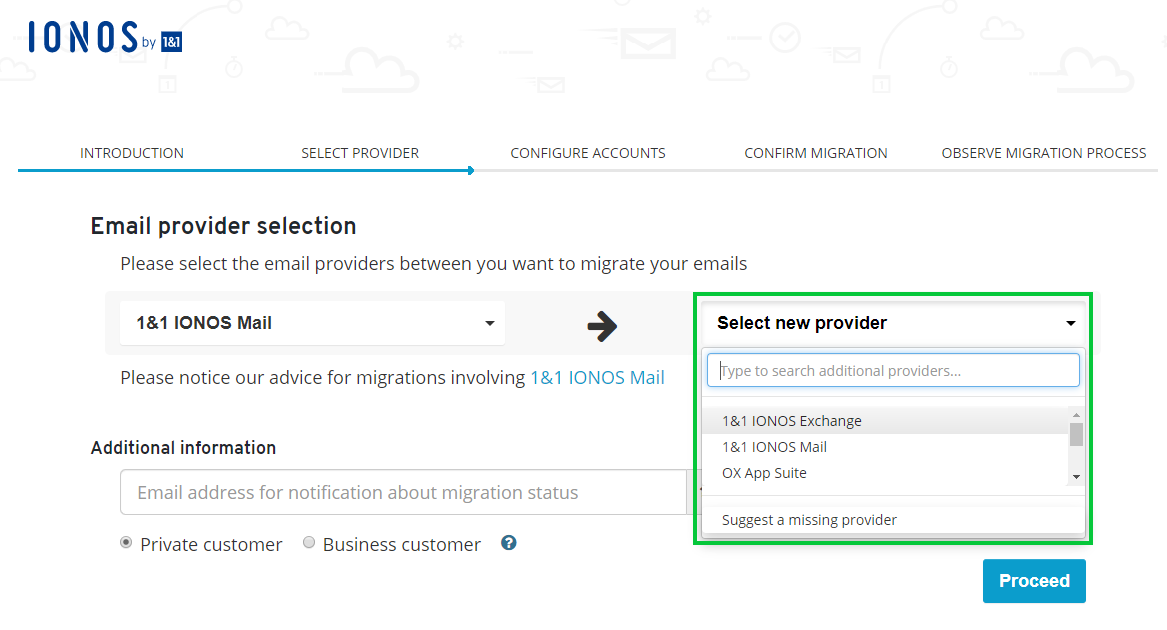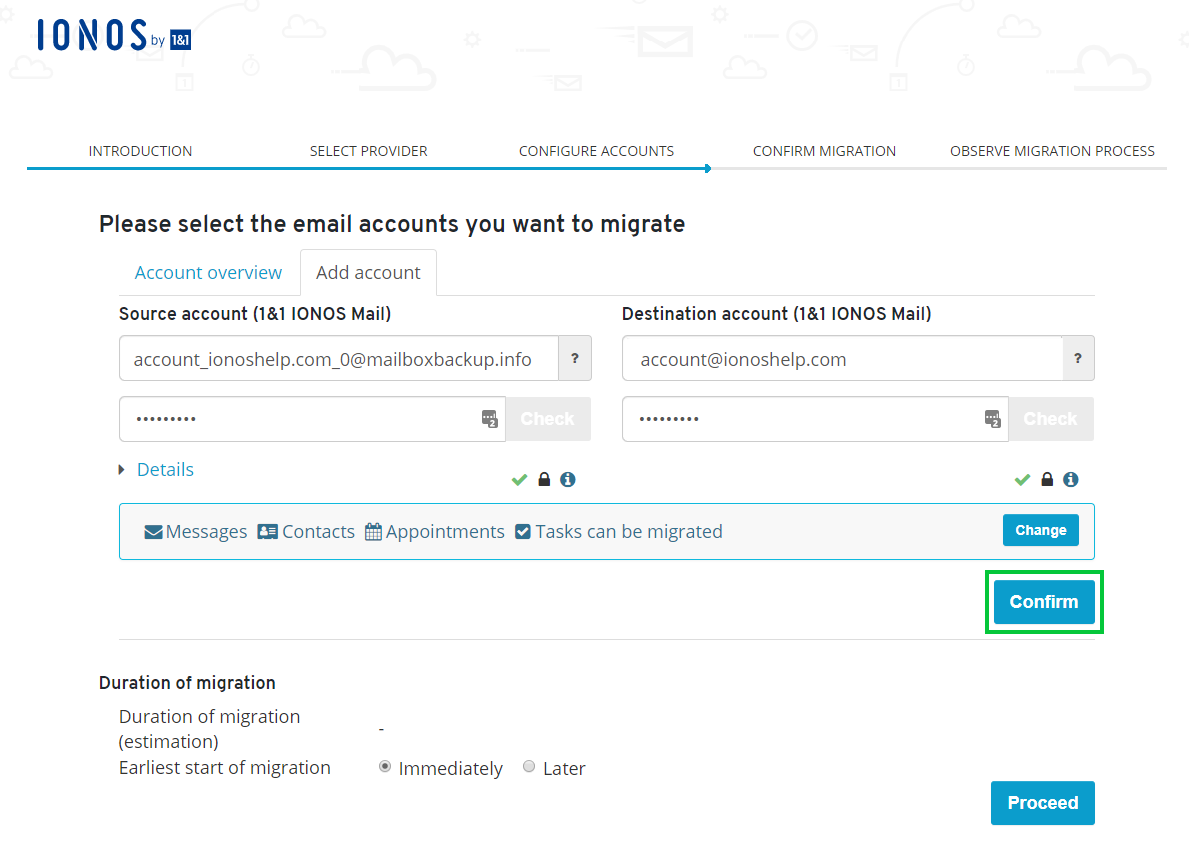Please use the “Print” function at the bottom of the page to create a PDF.
In this article, you will learn how to move the emails and folders of an IONOS email account to another using the IONOS Email Migration Tool powered by audriga. This may be helpful/necessary, for example, if you want to use your email accounts with a domain in another IONOS contract within your account or another account altogether. You can migrate the following data:
- Emails and folders using IMAP or POP3
- Emails and folders, contacts, calendars and tasks from Open-Xchange and Microsoft Exchange
Depending on the type of email account (Standard, OpenXchange, Microsoft Exchange), you may also be able to migrate additional data, such as contacts or calendar entries.
You won't need to install any special software. The IONOS Email Migration Tool powered by audriga connects using the same protocols as an email program and copies your emails from account to account.
Alternatively, we offer a Setup and Migration Service through which one of our experts give you one-on-one assistance with the migration of your emails from one or more email accounts to IONOS. Feel free to contact us at any time to find out more or to order the service.
Please Note
For this type of email migration, only data that is stored on IONOS servers is transferred. You can see this data in the IONOS Webmail portal, for example. We do not have access to data that is stored exclusively on your end device.
Important Information
The password of the source and target mailbox must not be changed during the migration.
Make sure that emails and folders are not deleted in the source or destination mailbox during migration.
Source and target mailboxes must always have different email addresses. If these are identical, you will see an error message in the IONOS Email Migration Tool powered by audriga. If necessary, rename the email address in the source mailbox. Example: To migrate emails from a source/origin email account named info@example.com to a new email account at IONOS named info@example.com, the source/origin email address can simply be renamed to info.old@example.com.
Preparation
After Transferring a Domain to Another IONOS Contract or Account
When you transfer a domain, all email addresses that you have set up for that domain are deleted. However, in order to prevent unintentional data loss, the mailboxes with all of the emails in them remain in place.
To ensure that you continue to have access to your mailboxes, they are assigned a backup address in the following format:
old_address.com_0@mailboxbackup.info
If the domain ionoshelp.com is deleted, for example:
The address mail@ionoshelp.com will be renamed to mail_ionoshelp.com_0@mailboxbackup.info
The address john@ionoshelp.com will be renamed to john_ionoshelp.com_0@mailboxbackup.info
And so on
If the email address has more than 25 characters, it will be shortened to 25 characters when the backup addresses are created.
To move the emails and folders of an email account using the IONOS Email Migration Tool powered by audriga, simply follow these steps:
Set up an email account in the contract containing the transferred domain for each mailbox being migrated.
Check how much disk space the source mailbox is using. If this exceeds the size of the newly created accounts, the migration will fail. If this is the case, you can simply upgrade the new accounts to a type with as much or more storage space.
Follow the steps below called Starting the Email Migration.
You can find additional information on transferring a domain to another IONOS contract or account here:
Moving Emails and Folders Between IONOS Email Accounts
To use the Email Migration Tool, you must set up a destination (receiving) mailbox for each source (sending) mailbox. You also need the login details for the source and destination mailboxes.
We recommend that you assign temporary passwords for your mailboxes and use them during the migration.
Before moving, check how much space is being used in the source mailbox. This must not exceed the size of the newly created target mailbox.
Please Note
Do not delete or move folders or other data in the source and destination mailboxes during the migration.
Starting the Email Migration
To open the web app for the IONOS Email Migration Tool powered by audriga, click here: https://emailmigration.ionos.com/mig/?client=ionos&locale=en.
Read and accept the terms of use and the privacy policy.
Click Proceed.
Click Select current provider.
To move mail and folders of a Mail Basic or Mail Business mailbox, select 1&1 IONOS Mail. To move the emails and folders of a Microsoft Exchange mailbox, type IONOS in the input field and select the appropriate product, such as 1&1 IONOS Exchange (US).
Select the desired IONOS product in the Select new provider field.

In the Additonal information section, enter the email address where you can receive status messages during the migration.
Specify whether you are a private or a business customer.
Note
If you are a business customer, you will be offered a standard contract for order data processing.
Click Proceed.
Enter the login details for your source and destination email accounts.
To check whether the login is possible, click Check for each account.
If the login is possible, click on Confirm, and the estimated migration time will be calculated and displayed.

In the Earliest start of migration section, specify the desired start time.
Click Proceed, and the summary will be displayed.
Click Start Migration, and a status page will be displayed where you can follow the progress of the migration. In some cases, it may take some time before your migration starts. Depending on the amount of data, a migration can take several hours, and you can close the status page displayed while the migration is in progress. The migration will continue automatically, and a notification email will be sent to the email address you provided. These notification emails contain a link with which you can view the status page again.
Starting a Delta Migration
After you have completed the email migration, you can start a Delta (change) Migration once on the status page. This will copy emails that arrived in the source mailbox after the email migration finished.